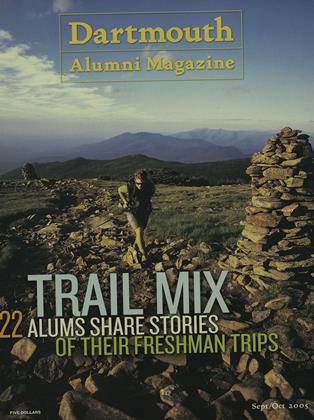The class of 2005 was distinguished by more than its arrival in Hanover on 9/11. Its one constant was change.
EVEN AS WE WELCOME THE CLASS OF 2009, the presence of the class of 2005 continues to echo around the campus. It is remarkable the way different classes take on their own personalities defined by the individual members, the historical context and the external forces that influence their lives here. This class was quite a group.
We first met them under difficult circumstances-September 2001, on 9/11—when the world changed around us. Many of the '05s were on their first-year trips. Susan and I went to the Ravine Lodge to share with them the news of what had happened while they were out along the trails and streams of the North Country. So we bonded at a time of great national tragedy. Their college years also saw a significant economic downturn, wars in Afghanistan and Iraq and increasing concerns over homeland security.
Midway through the '05s' senior year, global consulting firm Booz Allen Hamilton announced the conclusion of a project to determine the worlds 10 most enduring institutions. They included the Salvation Army, General Electric, Sony, the American Constitution and the Rolling Stones. In the area of education, it named Oxford University in England—and Dartmouth College in New Hampshire. Ralph Shrader, the CEO of Booz Allen Hamilton, described an enduring institution as "one that has changed and grown in unswerving pursuit of success and relevance—yet remained true through time to its founding principles."
The members of the class of 2005 willingly embraced change, including the development of a wireless computing system, the rise of blogs that chronicled the life of the College and new courses in quantum information sciences, the digital humanities and new media, and brain sciences. Their Dartmouth experience marked increased participation in the Tucker Foundation and projects such as Habitat for Humanity and the relief efforts for the South Asian tsunami. An amazing 11 percent sought to join Teach for America. The faculty attest that these '05s made the intellectual and academic life of the community even stronger and even more rewarding. They started new magazines and journals. They developed a new peer advising system. Their four years saw the revitalization of the snow sculpture at Winter Carnival, the strengthening of the Greek system and the involvement of many different students in the presidential election of 2004. They helped to restore the swimming and diving teams, and they helped to develop programs to evaluate and recognize the best teachers at the College. They made Dartmouth their own. And they share a sense of community for which Dartmouth is known—one that binds them together and to the College.
The class of 2005 broke all recent records for participation in the senior class gift. More than 55 percent of them participated, and they will fund 14 sophomore scholars, thus ensuring that future students will have the same sort of experience.
When this class returns in five years for the first of many reunions, Dartmouth will have changed. The '05s will see the finished McLaughlin Cluster, new dorms on Tuck Mall, a new dining hall, a new arts addition, a life sciences project underway, Kemeny Hall and the Haldeman Centers completed and Bradley and Gerry halls gone. They will encounter new people and old friends among faculty and staff—and new students determined to leave their own imprint on the College. They will also find the same commitment to undergraduate learning that they see now, the same commitment by the faculty to work closely with students, the same commitment to financial aid and to keeping Dartmouth accessible to a wide range of students, the same commitment to the out-of-classroom experience, to a sense of true community that is open to all of its members, and the same commitment to providing the very best liberal arts education anywhere.
I recall meeting with a 50th reunion group some 25 years ago. I said then that Dartmouth has two fundamental obligations to its students. The first is to provide each class with an educational exerience that is so strong and so relevant to their time that upon graduation they leave here feeling that Dartmouth cannot be improved upon in any substantial way and with a passionate desire to protect that experience. Our second obligation is to continue the historic process of adapting and changing so that the students who follow will graduate with the same feeling. If this explains some of the tension that often marks Dartmouth, it also explains this school's enduring strength.
 View Full Issue
View Full Issue
More From This Issue
-
 Cover Story
Cover StoryVoices Crying (and Laughing) in the Wilderness
September | October 2005 By BRYANT URSTADT ’91 -
 Feature
FeatureSex, Lies... and a Pulitzer Prize
September | October 2005 By DAVID MCKAY WILSON -
 Feature
FeatureSoviet Union
September | October 2005 By ROBERT SULLIVAN ’75 -
 PERSONAL HISTORY
PERSONAL HISTORYBand of Sisters
September | October 2005 By Maura Kelly ’96 -
 TRIBUTE
TRIBUTENo Quieter Bed
September | October 2005 By James Zug ’91 -
 Interview
InterviewThe Archivist
September | October 2005 By Sue DuBois ’05
JAMES WRIGHT
-
 Letters to the Editor
Letters to the EditorLETTERS
NOVEMBER 1990 -
 Cover Story
Cover StoryDartmouth's Steady Course
MARCH 1990 By James Wright -
 Feature
FeatureWAR AND REMEMBRANCE
December 1995 By James Wright -
 Feature
FeatureDartmouth's Productivity
March 1996 By James Wright -
 Article
ArticleThe Shape of Things to Come
JANUARY 1999 By James Wright -
 Feature
FeatureBattle Scarred
Sep - Oct By JAMES WRIGHT
Article
-
 Article
ArticleFine Arts Acquisitions
January, 1911 -
 Article
ArticleDartmouth Plaque
May 1939 -
 Article
ArticleTHREE BROTHERS DISTINGUISHED ALUMNI
November 1942 -
 Article
ArticleNew Staff Members
OCTOBER 1972 -
 Article
ArticleDartmouth 20, Brown 0
November 1960 By DAVE ORR '57 -
 Article
ArticleOld Tradition, New Support
Mar/Apr 2003 By Kate Lilienthal '88

